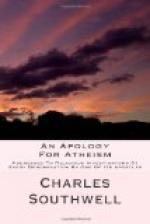Not inaptly, we conceive, has religion been likened to a madman’s robe, for the least puff of reason parts it and shows the wearer’s nakedness. This view of religion explains the otherwise inexplicable fact that eminent piety is usually associated with eminent imbecility. Such men as Newton, Locke, and Bacon are not remembered and reverenced on account of their faith. By all but peddling narrow-thoughted bigots they are held in honour for their science, their matter-of-fact philosophy; not their puerile conceits about ‘airy nothings,’ to which half crazed supernaturalists have assigned ‘a local habitation and a name.’ Lord Bacon laid down principles so remote from pious, that no man can understand and philosophise in strict accordance with them, if he fears to embrace Atheism. From his Novum Organum Scientiarum may be extracted an antidote to the poison of superstition, for it is there we are told that aiming at divine things through the human, breeds only an odd mixture of imaginations. There we are told that Man, the servant and interpreter of Nature, can only understand and act in proportion as he observes or contemplates the order of nature—more he cannot do. There too is set down the wise lesson that truth is justly to be called the daughter, not of Authority, but Time. Bacon abhorred superstition. He denounced it as the ‘confusion of many states,’ and for a ’religious philosopher’ wrote most liberally of Atheism. No one who has read his Essay on Superstition can doubt that he thought it a far greater evil than Atheism. Any man who should now write as favourably of Godlessness would be suspected of a latitudinarianism quite inimical to the genius and spirit of ‘true religion.’ The orthodox much prefer false piety to no piety at all. Mere honesty does not satisfy them. They insist on faith in their chimerical doctrines and systems, as ’the basis of all excellence.’ To please them we must sacrifice truth as it is in Nature, at the shrine of truth as it is in Jesus, and believe what derives no sanction from experience. Bacon taught us to ‘interpret nature,’ and that ’aiming at the divine through the human breeds only an odd mixture of imaginations;’ but these hair-brained fanatics who would have us believe him one of them, care little for natural




